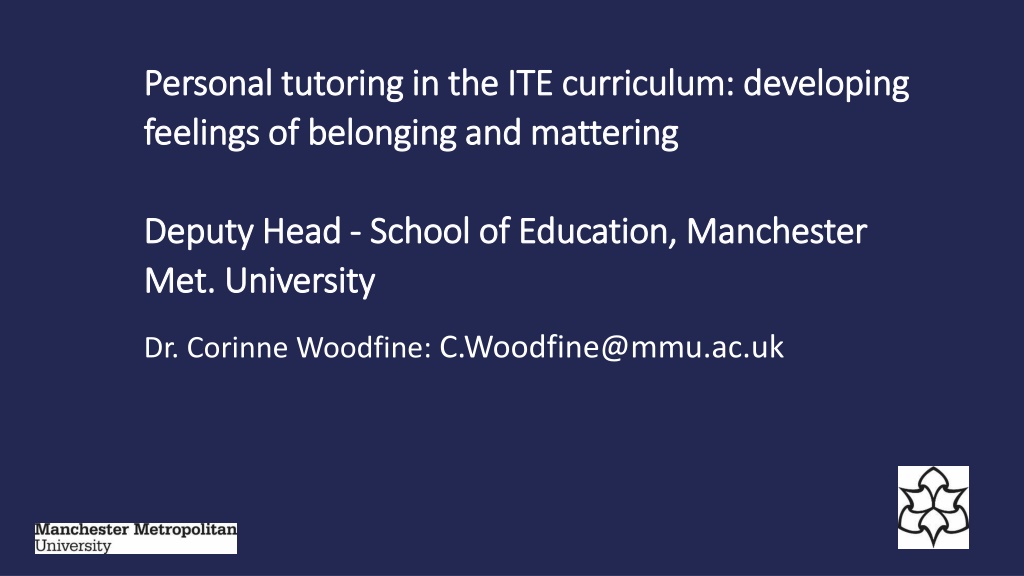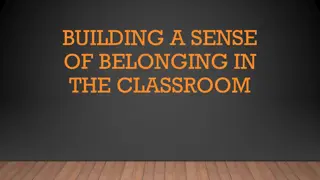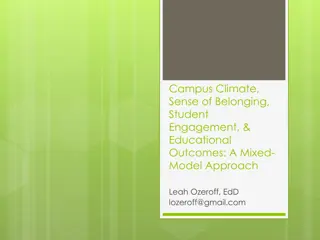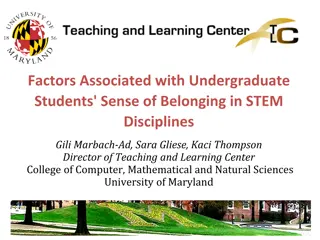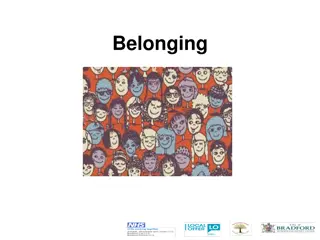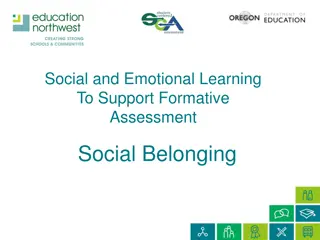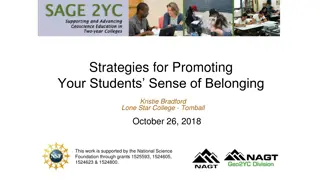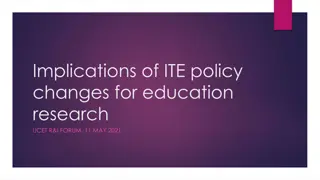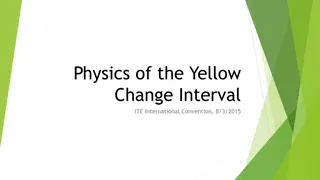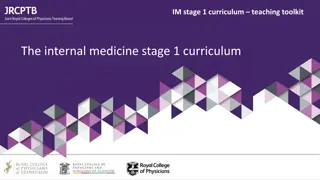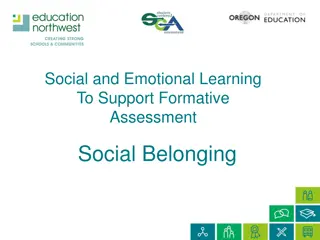Enhancing Belonging and Mattering in ITE Curriculum
Personal tutoring in the ITE curriculum focuses on developing feelings of belonging and mattering among students to ensure their mental health and academic success. Belonging is described as a basic human motivation, essential for well-being, while mattering is about feeling significant and valued in one's environment. Strategies such as social events, peer support, and acknowledging students' importance can foster a sense of belonging and mattering, despite challenges like large student cohorts and limited resources.
Download Presentation

Please find below an Image/Link to download the presentation.
The content on the website is provided AS IS for your information and personal use only. It may not be sold, licensed, or shared on other websites without obtaining consent from the author.If you encounter any issues during the download, it is possible that the publisher has removed the file from their server.
You are allowed to download the files provided on this website for personal or commercial use, subject to the condition that they are used lawfully. All files are the property of their respective owners.
The content on the website is provided AS IS for your information and personal use only. It may not be sold, licensed, or shared on other websites without obtaining consent from the author.
E N D
Presentation Transcript
Personal tutoring in the ITE curriculum: developing Personal tutoring in the ITE curriculum: developing feelings of belonging and mattering feelings of belonging and mattering Deputy Head Deputy Head - - School of Education, Manchester School of Education, Manchester Met. University Met. University Dr. Corinne Woodfine: C.Woodfine@mmu.ac.uk
BA: Academic and Professional Practice (APP) L4-L6 ITE Primary Units - context PGCE: Professional Development and Employability (PDE) L7
Teacher identity and values Reflecting on emerging student identities, who we are and what we stand for (Pollard, 2014) Establishing trainee teachers' own identities in professional spaces. Professionalism
Personal tutoring and Belonging Maslow (1962) describes belonging as a basic human motivation in which all people share a strong desire to belong to a group or community. Sense of belonging found to be essential for mental health & well- being (Hagerty et al, 1996) Belonging is critical to student retention and success (Thomas, 2017)
Belonging What are we all doing? Encouraging social events, clubs and societies Team activities and competitions Peer support and peer learning Encouraging group discussions Welcome events, communications, goodies Significant events, parties , awards for students.
Mattering What is it? The perception that we are a significant part of the world around us. People matter because: others attend to them (awareness), invest in them (importance) or look to them for resources (reliance) (Elliott, 2004). Derive a sense of mattering from the quality and quantity of attention received from others (Watson, 2018). Dixon and Tucker (2008) found social support from college friends was a predictor of their sense of mattering, and the students who felt supported and as if they mattered to experienced less academic stress. Tovar (2013) found mattering to have a moderate to strong influence on engagement, socio- academic integration, belonging and intention to persist. Ning et al. (2021) found that students from underrepresented groups did not experience the same level of belonging and mattering despite attending the same welcome events.
Mattering - Challenges Large student cohorts Time / resources / workload Emotionally draining Being accepted as a colleague in schools Variable experiences Being made to feel like you don t matter, are insignificant or unimportant, has a lasting impact.
Zawada (2022) Student belonging and mattering: the impact on academic achievement UG Health Professional students completed a questionnaire comprising of: Demographic data Mattering at university scale Mattering on placement scale Belonging at university scale Belonging on placement scale
Lowest scored items on the mattering scales University My successes are a source of pride to people in my life I have noticed that people will sometimes inconvenience themselves to help me There are people in my life who react to what happens to me in the same way they would if it had happened to them Placement People count on me to be there in times of need People tend to rely on me for support When people need help they come to me Quite a few people look to me for advice on issues of importance
Questions we asked ourselves How often do our students/trainees have individual, one-to-one contact? How often are individual meetings motivational rather than punitive? How big a voice do ALL students have? Do we demonstrate pride in our students for their individual successes? If a student did the minimum required of them, how long could they go without any individual communication with staff or their peers?
Academic and Professional Practice (APP) Progression from Y1-Y3 Time to write Time to read Time to explore the Core Content Framework/ MMU Curriculum and placement Learning Outcomes Time to talk to personal tutor and peers no agenda Time to reflect Time to share individual achievements and target support
Academic and Professional Practice spiral curriculum content L4/Y1: Teacher identity, academic skills development, personal and professional development, reflective practice, SK audits, FS audits, BM, prep for placement, mini-teach. L5/Y2:Lesson planning, student-teacher professionalism, working with expert colleagues on placement and Graduate Attribute(s). Wraps around placement L6/Y3: Professional behaviours, subject knowledge audits and goal setting prior to placement, effective relationships, D&D conference, SEND series, Exploring series (bullying/anti-bullying; gender; social justice, sustainability
Future me plan individual goal-setting Incorporates the 3 Cs of course , community and career Focus/ reflection on 5 Graduate Attributes: Collaboration; Creativity; Professionalism; Self-Motivation; Social Awareness Focus/ reflection on 7 Life Skills: Adaptability; Critical Thinking; Empathy; Integrity; Optimism; Being Proactive; Resilience Follows a series of cycles which link in with personal tutoring sessions and 1:1 progress reviews.
References Dixon, A. L. and C. Tucker (2008). "Every Student Matters: Enhancing Strengths-Based School Counseling through the Application of Mattering." Professional School Counseling 12(2): 123-126. Elliott, G. C., et al. (2004). "Mattering: Empirical Validation of a Social-Psychological Concept." Self And Identity 3(4): 339-354. Hagerty, B. M., et al. (1996). "Sense of belonging and indicators of social and psychological functioning." Archives of Psychiatric Nursing 10(4): 235- 244. Ning, L. et al (2021) The Impact of COVID-19 on Orientation, Transition, & Retention Programs, THE JOURNAL OF COLLEGE ORIENTATION, TRANSITION, AND RETENTION, Vol. 28 No. 2 Pollard, A. (2014) Reflective Teaching in Schools, Bloomsbury, London. Thomas, L., et al. (2017). Supporting student success: strategies for institutional change. Findings and Recommendations from the What Works? Student Retention and Success Programme, Paul Hamlyn Foundation, London. Tovar, E. (2013). A Conceptual Model on the Impact of Mattering, Sense of Belonging, Engagement/Involvement, and Socio-Academic Integrative Experiences on Community College Students Intent to Persist. CGU Theses & Dissertations. Paper 81. Watson, J. C. (2018). "Examining the Relationship between Self-Esteem, Mattering, School Connectedness, and Wellness among Middle School Students." Professional School Counseling 21(1): 108-118. Zawada, C. (2022) Student belonging and mattering: the impact on academic achievement, UKAT Tutoring Matters Webinar Series
